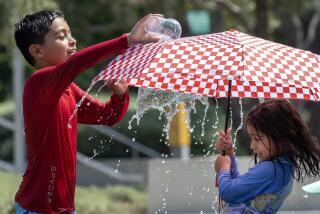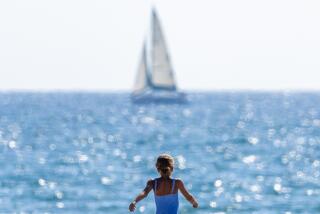Summer Sun Generates Added Hazards
- Share via
For many people summer is the time for swimming, sailing, picnics and outdoor recreation. However, summer heat and sun can be treacherous.
Older people should be wary of food poisoning and heat strokes, two potentially fatal illnesses associated with summer.
These days, most people do not give much thought to food poisoning. Modern methods to preserve food and retard bacteria should make the food we eat safe. Bacteria such as salmonella, botulism, staphylococcus and campylobacter are presumed to be fears of a former generation.
In fact, most people would be surprised to learn that about 2 million cases of food poisoning occur each year in this country due to improper handling of food in the home.
Food poisoning can become epidemic at picnics or other events where food is left unrefrigerated for a long time, when power outages cause refrigerators to shut down and from canning procedures that fail to kill bacteria.
Diminished taste and smell also may be significant in determining if food is spoiled. Older people who live on a fixed income may be wary of throwing food away. And, in order to hold utility bills down, refrigerators often are kept above the recommended 40 degrees.
The following precautions can eliminate most sources of bacteria and prevent food poisoning:
* Refrigerate food at 40 degrees; freeze it at 0 degrees Fahrenheit.
* Freeze raw meat and poultry that will not be used within two days.
* To thaw food, place it in the refrigerator, not on the counter, where bacteria can grow quickly.
* Make sure food and utensils are clean.
* Wash hands with soap and water before preparing food.
* Cook food thoroughly, including food prepared in a microwave. Avoid recipes that call for raw eggs or raw fish.
* Freeze or refrigerate leftovers promptly.
* Never leave a perishable food out of the refrigerator for more than two hours.
Symptoms of food poisoning include diarrhea, abdominal pain and nausea. Sometimes it is accompanied by fever and general discomfort.
The U.S. Department of Agriculture has established a toll-free number to respond to consumer questions about safe handling of meat and poultry. Call (800) 535-4555 from 10 a.m. to 4 p.m. weekdays for information on proper food handling.
Heat exhaustion and heat stroke are other potentially dangerous conditions associated with hot weather. Many people become needlessly ill each year because they do not take simple, preventive steps.
Heat exhaustion is a warning that the body is getting too hot. Symptoms include thirst, giddiness, weakness, nausea and profuse sweating. If not attended to, heat exhaustion can develop into a more serious condition known as heat stroke.
Some medications such as diuretics, sedatives and tranquilizers, and certain heart and blood pressure drugs, may affect the way an individual copes with heat. Don’t discontinue medication, but discuss potential problems with a doctor.
Diseases that require special diets also may make a person more vulnerable to heat stroke. People with high blood pressure, for example, generally reduce the amount of salt in their diet, making temperature regulation more difficult. However, a person should not take salt tablets without consent of a doctor.
Avoid heat exhaustion and heat stroke by following some simple steps:
* Drink plenty of water and juices.
* Wear light-weight, light-colored and loose-fitting clothing.
* Avoid activity during the hottest part of the day.
* Keep meals simple and light. Keep oven use to a minimum.
* Use air-conditioners liberally or, if none is available, plan trips to cool places such as shopping malls, theaters and libraries.
Anyone suspected of suffering heat stroke should receive immediate attention. Victims of heat stroke have a body temperature of 104 degrees or higher. The pulse may be rapid.
Other symptoms may include flushed skin, a faint feeling, confused and bizarre behavior and combativeness. If symptoms are mild, get into a cool place, drink non-alcoholic, non-caffeinated fluids, and sponge off with cool water or take a cool bath or shower.
If symptoms are severe, get emergency medical assistance immediately.


